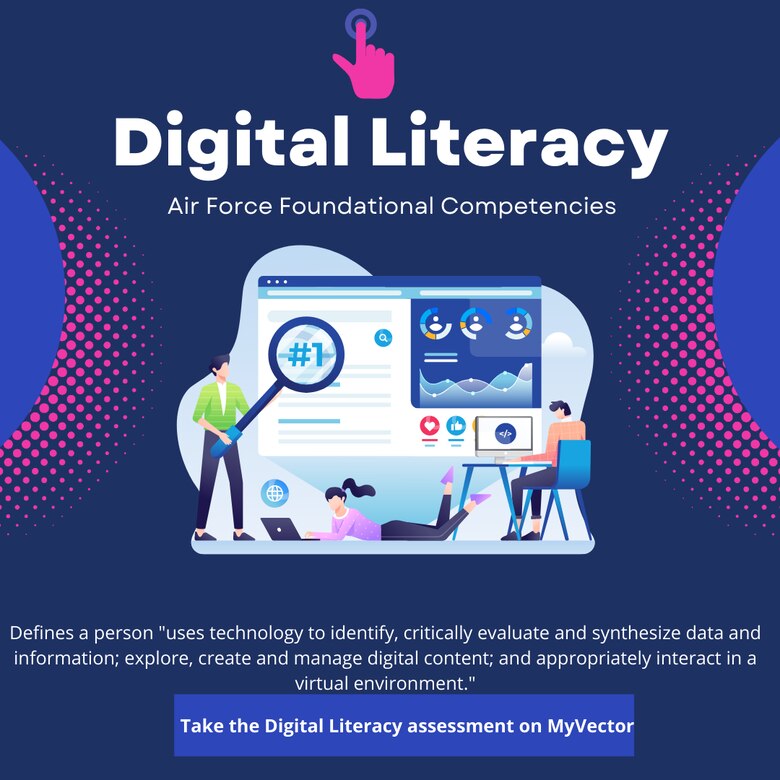The Air Force has identified 24 Air Force foundational competencies for all Airmen, as part of a systematic, competency-based approach to develop the force. These competencies are universally applicable to all Airmen and are categorized into four groups: Developing Self, Developing Others, Developing Ideas and Developing Organizations.
One of those 24 foundational competencies is digital literacy, which was added this year.
Digital literacy is defined as a person who "uses technology to identify, critically evaluate and synthesize data and information; explore, create and manage digital content; and appropriately interact in a virtual environment" according to Dr. Laura Barron, industrial/organizational psychologist.
"The Air Force's foundational competencies are applicable across all ranks, grades and career fields and provide Total Force members a pathway to success in their respective careers," said Lt. Col. Sandra Coble, Competency Division chief. "Air Force competencies lay the foundation for developing the Airmen we need, who can out-think and out-perform any adversary in air, space and cyberspace."
Digital literacy is demonstrated when Airmen use technology to identify, critically evaluate, and synthesize data and information; when Airmen explore, create, and manage digital content; and when Airmen appropriately interact in a virtual environment.
As citizens of the digital age, we can access information freely at all times through different types of platforms. But, knowing how to use technology is more than sending a text with emojis or getting around on your favorite social media site. It is about using the internet for learning, communicating, and most of all, being responsible while using technology.
"Our Airmen today have access to valuable resources to help them develop, and grow into the future Airmen we need to help accelerate change in our Air Force," said Jamal Qaiyyim. "The modernization of the learning services environment will enhance overall development for Airmen and ensure they are able to reach their full potential, quickly adapting to changes in the strategic and tactical environment."
Communicating in the digital age using digital tools like email, texting, video chat and social media is very different from interacting in person. Understanding the purpose of communication is key to making messages clear. Asking yourself questions like, who is your audience? Is this a one-on-one conversation or a team meeting? Is it professional or personal? How urgent is the message? Do you need a quick reply? Answers to these questions assist a communicator when determining the method of communication.
Understanding each digital tool will aid in the approach to engaging with an audience. Sending a text or giving a phone call may be faster than sending an email, because most people have phones readily accessible and may respond more quickly. When communicating to a team, using platforms like Microsoft Teams or Skype ensures everyone gets the information at the same time. The team meeting reduces miscommunication between teammates due to second-hand information.
Communicating and learning from digital environments does not come without responsibility. Digital citizenship is how one interacts safely in this digital age. Everyone has to be diligent about how information is used. Verify that information is from credible sources. Know what information to avoid when it infringes on copyrights.
Do not pass along information if it hasn't been verified. As a leader, one must not share information that is not credible. Most importantly, before posting, think about how it will affect other people and understand individual responsibility when posting.
"It's every Airman's responsibility to understand proper etiquette when operating in the digital environment," said Isabel Hodges. "Operational security, credible sources and getting a second set of eyes on posting or sharing are ways to ensure safe use of the digital environment."
MyVector now provides access to a Digital Literacy Self-Assessment. Using this self-assessment tool, Airmen will receive instant feedback on distinct aspects of digital literacy, such as Information Literacy, Social Media Awareness and Digital Communication. Airmen also have free access to over 5,500 Udemy courses through the Digital University and can use MyVector to identify online resources that help align with personal goals.
Airmen can also elect to complete the Pathfinder 2021 assessment for feedback on other foundational competencies like resilience, teamwork and analytical thinking. The pathfinder tool allows the option to request supervisor feedback and 360-degree feedback to gain valuable insight from peers, subordinates and higher ranking members. These tools can be used by Airmen at all levels.
"The Air Force's foundational competencies are the common currency of force development and are a powerful tool for Airmen to use as a pathway to success," Coble said.

This Air Force Foundational Competencies Digital Literacy graphic defines digital literacy as a person who "uses technology to identify, critically evaluate and synthesize data and information; explore, create and manage digital content; and appropriately interact in a virtual environment" according to Dr. Laura Barron, industrial/organizational psychologist. (U.S. Air Force graphic by Staff Sgt. Keith James)






